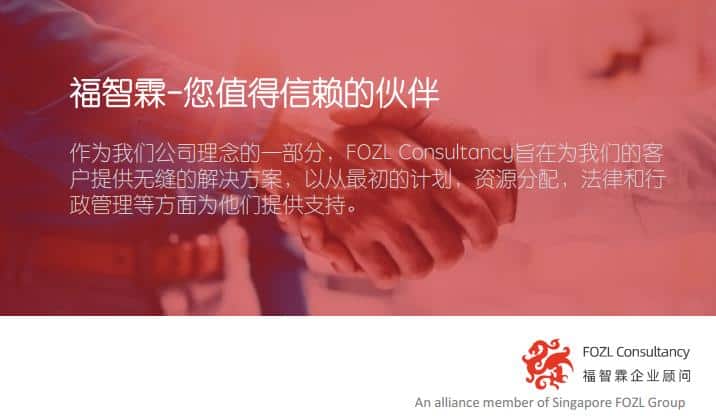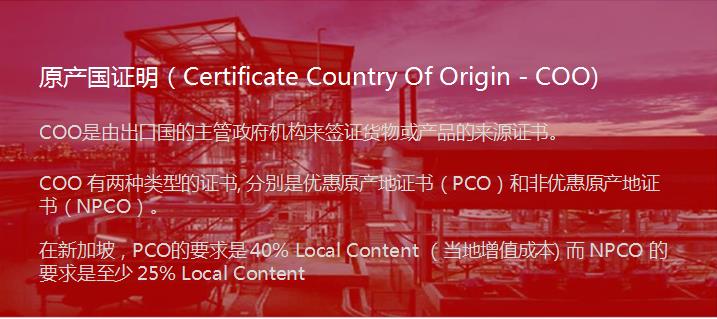2020-04-09
Corporate Structuring Supporting companies to pave the right foundation on establishing a suitable corporate structure to address their current and future needs. There are many factors that affect how a company should be structured that needs to be considered. FOZL takes these various factors into consideration and provides advisory and analytical services to business owners and company executives to define the objectives of the structure, understand what factors are critical and what are the possible solutions to address it. Allowing them to understand and decide what would be the suitable corporate structure that is appropriate for addressing current and future […]
2020-04-08
Market/Industry Research Helping companies to quickly understand Singapore’s business landscape and regulations to ensure the success of their investments When foreign companies invest in or expand their business into a new market, it is important that they have a holistic understanding of the business landscape and local regulations in terms of cost and benefits, risk, and potential. With sufficient and accurate information, business owners / management will have the confidence to make well-informed decisions for their investment and operations. FOZL Consultancy provides customised market feasibility studies based on each business’ unique requirements therefore helping business owners /management to reduce opportunity […]
2020-04-08
Strategic Planning Creating sustainable growth through in-depth understanding and managing your business better with FOZL. Entrepreneurs know their business best, but they face the challenge of how to create a sustainable business through corporate governance and internationalisation. FOZL aims to provides consultancy and training services to shareholders and/or senior company executives. This allows them to clarify their vision and growth plans so that they can refine their company’s vision, blueprints for business expansion and product development, and avoid potential pitfalls. This is important for businesses as it gives them a clear picture of the investments and resources required as well […]
2020-04-08
2020-04-02
Fair Employment Practices Implementing the principle of fair employment has good commercial significance. In Singapore, a country with diverse races, religions, ages and genders, this is also the right thing to do. What is the principle of fair employment? The principle of fair employment includes fair, merit-based and non-discriminatory employment systems. Why should we follow the principle of fair employment? Get a wider talent pool Through fair recruitment and merit-based recruitment, you can ensure that you have the largest candidate pool. This is particularly important because Singapore’s labour supply is declining. Older workers and women are essential in reducing the […]
2020-03-24
Import and Export Import of Goods Before goods are imported into Singapore, the importer is required to apply for a permit from the Singapore Customs and Excise Department (SCED) through Trade Exchange. If the relevant requirements are met, the Singapore Customs and Excise Department will issue a Singapore Import Certificate and Confirmation of Delivery to the importer to ensure that the goods are actually imported into Singapore and not diverted or exported to a prohibited destination. In general, all imported goods are subject to GST. If the imported goods are controlled goods, a permit application must be submitted to and […]
2020-03-24
Singapore Ship Registration What are the requirements to register a ship in Singapore? Ships must meet the following requisites to be registered in Singapore. Ship Owners Only the following persons may be registered as owners of Singapore registered ships: Singapore citizens or Singapore permanent residents Companies incorporated in Singapore, including foreign or local enterprises. A foreign company is defined as a company incorporated in Singapore in which a non-Singaporean citizen owns more than 50% interest. A local company is defined as a company incorporated in Singapore in which more than 50% interest is held by a Singapore citizen or other […]
2020-03-23
A dormant company is a company registered with the Singapore ACRA (Accounting and Corporate Regulatory Authority), but the company has not had any business activities in the past financial year, and has no business income or business expenses (except the basic cost of maintaining the company’s existence) ). Such a company can be considered a dormant company. ACRA and Inland Revenue Authority of Singapore also have corresponding policies on dormant companies. ACRA: Dormant company can waive preparation of company’s financial report Dormant companies may be exempt from annual shareholders’ meetings The dormant company still has to submit an […]
2020-03-23
XBRL (eXtensible Business Reporting Language) is an XML-based markup language used for the definition and exchange of business and financial information. After the company completes its accounts, it needs to convert the existing financial report into the XBLR format according to the XBRL format and classification requirements. During the conversion process, XBRL software will also compare and verify the company’s financial report data. Since 2014, the Singapore government has required companies to submit financial statements in Extensible Business Reporting Language (XBRL). XBRL is an XML-based format for financial documents used for business document exchange financial information. The format is open […]
2020-03-23
The Singapore Companies Act requires a company to hold an annual general meeting (AGM) unless the company elects not to hold an annual general meeting through a shareholder resolution. If the company chooses not to hold the annual general meeting, all matters to be handled at the annual general meeting can be resolved by written resolution. What is an annual general meeting? The annual general meeting of shareholders is a general meeting of shareholders held at specified intervals in each calendar year. The meeting gave company shareholders the right to participate in certain decisions that require the company’s approval. […]
2020-03-23
According to the Singapore Companies Act, every Singapore company must submit an annual review report to the relevant government agency every year. These annual compliance requirements are mandatory and include the following: Financial accounting, according to Singapore accounting standards to complete the company’s accounts for the previous financial year. Prepare the company’s financial report in accordance with the Singapore Financial Reporting Standard (SFRS). Held the company’s annual shareholder meeting. If the company meets the requirements, it can also apply to not hold the annual general meeting and complete it by signing and confirming the financial report. The directors of the […]
2020-03-23
The company needs to prepare relevant annual review documents in advance when conducting the annual review, including but not limited to: financial report: Director’s Report and Director’s Statement Independent auditor’s report (if applicable) Statement of comprehensive income (income statement) Statement of financial position (balance sheet) Cash flow statement Statement of shareholders’ equity Corresponding explanation of financial statements Directors’ statement. Exempt company statement (if applicable). Solvency statement. Adopt the financial resolution. Exempt audit resolution (if applicable). Consent form of company members. Other related documents. All the documents mentioned above require the signatures of relevant directors and members.
2020-03-23
In accordance with the relevant provisions of Chapters 175, 197, 201 of the Singapore Companies Act. Companies whose financial year ends after August 31, 2018 need to submit the annual review on time: For a newly registered company, the first financial year must end within 18 months. The financial year of a Singapore company is based on 12 natural months. After the company ends its financial year Listed company: The company’s shareholders meeting must be held within 4 months. Annual review must be submitted within 5 months. non-listed company. The company’s shareholders meeting must be held within 6 months. The annual review […]










